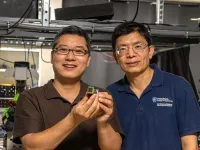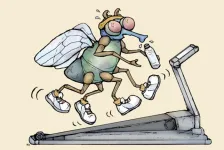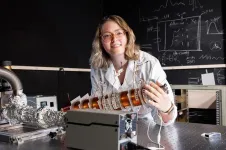(Press-News.org) Rates of prostate cancer across Europe since 1980 are “indicative of overdiagnosis”, say researchers in a study published by The BMJ today.
Overdiagnosis refers to the detection of harmless cancers that are unlikely to cause symptoms or death during a patient’s lifetime, which can lead to unnecessary treatment, negative impacts on quality of life, and wasted healthcare resources.
The findings show rapid increases in the number of new cases (incidence) in parallel with uptake of so far predominantly opportunistic prostate specific antigen (PSA) testing. Yet death rates during 1980-2020 were much lower and less variable, with steady declines in most countries and fewer differences between countries.
This divergence between incidence and deaths “suggests that the intensity and coverage of PSA testing has been a critical driver for the increasing trends in prostate cancer incidence in Europe,” say the researchers, which reinforces the need to minimise harms of overdiagnosis.
This is of particular relevance for the potential implementation of population-wide prostate cancer screening programmes, which, if implemented in the future, should be carefully designed and planned to minimise and monitor the harms of overdiagnosis in the population, they add.
Unregulated and opportunistic PSA testing has been, and still is, common in Europe. The EU Beating Cancer Plan recently proposed a new strategy for prostate cancer screening programmes, but baseline data on national levels and trends in prostate cancer outcomes are needed before new approaches are introduced.
To do this, researchers obtained data on annual incidence rates of prostate cancer for men aged 35-84 years in 26 European countries from 1980-2017 and mortality data from 1980-2020. They also carried out a review of studies on uptake of PSA testing across 12 European countries.
They found that incidence more than doubled in most countries from 1990 to 2017, in parallel with uptake of PSA testing, although the pace of increase varied greatly across countries and over time.
For example, increases in incidence were highest in northern Europe, France, and the Baltic countries, notably in Lithuania where rates increased up to eightfold. The difference between the highest and lowest incidence rates across countries ranged from 89.6 per 100,000 men in 1985 to 385.8 per 100 000 men in 2007.
In contrast, death rates were much lower in absolute terms, spanning from 12 (Ukraine and Belarus) in 1981 to 53 (Latvia) deaths per 100,000 men in 2006. The difference between the highest and lowest death rates across countries ranged from 23.7 per 100,000 men in 1983 to 35.6 per 100,000 men in 2006.
Considering all countries and periods, there was up to a 20-fold variation in prostate cancer incidence, but only a fivefold variation in deaths.
This is an observational study so no firm conclusions can be drawn about cause and effect, and the researchers point to several limitations that mean the findings should be interpreted with caution.
Nevertheless, they say these results “should help to improve the understanding of the effect of PSA testing on incidence and mortality in Europe by highlighting consistent patterns across countries.”
“The current high incidence of prostate cancer in many countries may be inflated by unregulated and opportunistic PSA testing that serves to mask any variations due to causal factors and may be indicative of overdiagnosis,” they explain.
“Careful monitoring and assessment of the benefits and harms, including overdiagnosis, will be essential for the potential implementation of EU guidelines and the prospective introduction of population-wide prostate cancer screening,” they add.
[Ends]
END
Prostate cancer rates across Europe since 1980 “indicative of overdiagnosis” say experts
Findings reinforce need for carefully planned screening programs to minimize harms of overdiagnosis
2024-09-05
ELSE PRESS RELEASES FROM THIS DATE:
Children switch to walking and cycling to school after introduction of London’s Ultra-Low Emission Zone
2024-09-05
Four in ten children in Central London who travelled to school by car switched to more active modes of transport, such as walking, cycling, or public transport, following the introduction of the Ultra-Low Emission Zone (ULEZ), according to new research. In the comparison area with no ULEZ, Luton, only two in ten children made this switch over the same period.
Car travel contributes to air pollution, a major cause of heart and lung diseases including asthma attacks. Beyond this, it limits children's opportunities for physical activity, hindering their development and mental health, and increasing their risk of obesity and chronic illnesses.
Despite ...
Three top ways to stop smoking
2024-09-05
A major new scientific review of evidence published in the journal Addiction has identified three top strategies for quitting smoking:
Varenicline -- a prescription drug sold under the brand names Chantix and Champix among others.
Cytisine -- a plant-based compound available under prescription in the United Kingdom, in Canada as an over-the-counter natural health product (Cravv®) and throughout central and eastern Europe.
Nicotine e-cigarettes.
These work best when combined with behavioural support, ...
Scientific review reveals top three effective ways to stop smoking
2024-09-05
A major new review of evidence by a team of scientists, including a University of Massachusetts Amherst public health researcher, has identified the three best strategies for quitting smoking:
Varenicline – a prescription drug sold under the brand names Chantix and Champix, among others.
Cytisine – a plant-based compound not widely available in the U.S. but sold as an over-the-counter natural health product (Cravv®) in Canada and throughout Central and Eastern Europe, and available under prescription in the United Kingdom.
Nicotine e-cigarettes.
The review, published ...
HudsonAlpha researchers awarded NIH grant to identify genetic contributors to rare diseases in children
2024-09-05
As genetic sequencing technology becomes more accessible and efficient, researchers have made significant strides in understanding the genetic underpinnings of various diseases. This knowledge has led to a surge in clinical applications of genetic testing, offering hope and improved outcomes for individuals affected by many genetic diseases and disorders. Despite these successes, scientists continue to try to improve genetic testing technologies, because many individuals with rare diseases remain undiagnosed even after current state-of-the-art genomic testing.
Scientists at the HudsonAlpha Institute for Biotechnology ...
The signals in your brain that tell you when It’s time to move
2024-09-05
A new study, published in Nature Communications this week, led by Jake Gavenas PhD, while he was a PhD student at the Brain Institute at Chapman University, and co-authored by two faculty members of the Brain Institute, Uri Maoz and Aaron Schurger, examines how the brain initiates spontaneous actions. In addition to demonstrating how spontaneous action emerges without environmental input, this study has implications for the origins of slow ramping of neural activity before movement onset—a commonly-observed but poorly understood ...
Hudson River Foundation awards $1.7 million to Cary Institute for river monitoring program
2024-09-04
(Millbrook, NY) The Hudson River Foundation for Science and Environmental Research (HRF) has awarded $1.7 million to Cary Institute of Ecosystem Studies to monitor the Hudson River’s lower food web for three years. The project is an integral component of the $6.5 million Hudson River Ecosystem Monitoring Program, a collaboration of HRF and New York State Department of Environmental Conservation (DEC) to develop and implement the next generation comprehensive ecosystem monitoring program on the Hudson.
Cary’s Chris Solomon will lead the Interim Lower Food Web Survey to provide ...
$7.5 million grant to guard against AI-driven misinformation
2024-09-04
BLOOMINGTON, Ind. — Indiana University researchers will lead a multi-institutional team of experts in areas such as informatics, psychology, communications and folklore to assess the role that artificial intelligence may play in strengthening the influence of online communications — including misinformation and radicalizing messages — under a $7.5 million grant from the U.S. Department of Defense.
The project is one of 30 recently funded by the department’s Multidisciplinary University ...
Seeing like a butterfly: Optical invention enhances camera capabilities
2024-09-04
UNIVERSITY PARK, Pa. — Butterflies can see more of the world than humans, including more colors and the field oscillation direction, or polarization, of light. This special ability enables them to navigate with precision, forage for food and communicate with one another. Other species, like the mantis shrimp, can sense an even wider spectrum of light, as well as the circular polarization, or spinning states, of light waves. They use this capability to signal a “love code,” which helps them find and be discovered by mates.
Inspired ...
Miniature treadmills accelerate studies of insects walking
2024-09-04
Fruit flies walking on miniature treadmills are helping scientists learn how the nervous system enables animals to move in an unpredictable and complex world.
Insights from using these fruit fly-sized treadmills were reported Aug. 30 in Current Biology, a Cell Press journal. Several videos of the flies running on the treadmills are available for viewing on the online research paper. The lead author is Brandon G. Pratt, a recent physiology and biophysics Ph.D. graduate of the University of Washington School of Medicine in Seattle and a National Science Foundation ...
UTA undergraduate researcher receives national honors
2024-09-04
A physics student at The University of Texas at Arlington studying ways to measure the mass of tiny particles called neutrinos has earned a prestigious national award for her research.
Senior Kara Stogsdill received the Outstanding Undergraduate Research Award from the Society of Physics Students, an organization of the American Institute of Physics. The award is given to students based on exceptional research achievements in any physics-related field.
Stogsdill’s research is part of the Project 8 Neutrino Mass Experiment, which includes faculty and students from UTA and 13 other universities and national laboratories ...
LAST 30 PRESS RELEASES:
Industrial research labs were invented in Europe but made the U.S. a tech superpower
Enzymes work as Maxwell's demon by using memory stored as motion
Methane’s missing emissions: The underestimated impact of small sources
Beating cancer by eating cancer
How sleep disruption impairs social memory: Oxytocin circuits reveal mechanisms and therapeutic opportunities
Natural compound from pomegranate leaves disrupts disease-causing amyloid
A depression treatment that once took eight weeks may work just as well in one
New study calls for personalized, tiered approach to postpartum care
The hidden breath of cities: Why we need to look closer at public fountains
Rewetting peatlands could unlock more effective carbon removal using biochar
Microplastics discovered in prostate tumors
ACES marks 150 years of the Morrow Plots, our nation's oldest research field
Physicists open door to future, hyper-efficient ‘orbitronic’ devices
$80 million supports research into exceptional longevity
Why the planet doesn’t dry out together: scientists solve a global climate puzzle
Global greening: The Earth’s green wave is shifting
You don't need to be very altruistic to stop an epidemic
Signs on Stone Age objects: Precursor to written language dates back 40,000 years
MIT study reveals climatic fingerprints of wildfires and volcanic eruptions
A shift from the sandlot to the travel team for youth sports
Hair-width LEDs could replace lasers
The hidden infections that refuse to go away: how household practices can stop deadly diseases
Ochsner MD Anderson uses groundbreaking TIL therapy to treat advanced melanoma in adults
A heatshield for ‘never-wet’ surfaces: Rice engineering team repels even near-boiling water with low-cost, scalable coating
Skills from being a birder may change—and benefit—your brain
Waterloo researchers turning plastic waste into vinegar
Measuring the expansion of the universe with cosmic fireworks
How horses whinny: Whistling while singing
US newborn hepatitis B virus vaccination rates
When influencers raise a glass, young viewers want to join them
[Press-News.org] Prostate cancer rates across Europe since 1980 “indicative of overdiagnosis” say expertsFindings reinforce need for carefully planned screening programs to minimize harms of overdiagnosis




